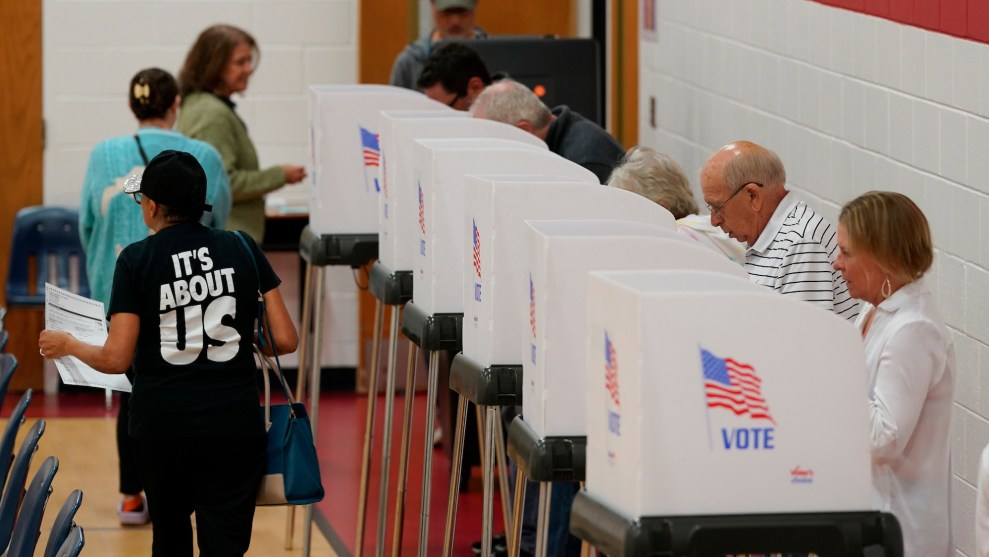
A voter carries her ballot to the counting machine after voting at a polling station Nov. 7, 2023, in Richmond, Va. (Steve Helber/AP)
Democratic victories in Tuesday’s off-year elections were also major triumphs for the efforts to protect democracy and expand voting rights—a continuation of a trend from last year’s midterms, when Republican candidates who had sought to undermine fair elections lost in key battleground states.
In Virginia this year, Democrats won both houses of the state legislature, which will prevent Republicans from instituting sweeping curbs on voter access. Democrats dramatically expanded voting rights when they previously controlled the Commonwealth State in 2020 and 2021, but Republicans have since sought to aggressively curtail or eliminate the state’s pro-voting reforms. Earlier this year, every Republican member of the state house voted to shorten the state’s early voting period, ban absentee ballot drop boxes, eliminate automatic and Election Day registration, reinstate a strict voter ID law, and increase purges of the voter rolls. Those bills were narrowly blocked by the Democratic-controlled state Senate, and Tuesday’s results mean Republicans won’t be able to pass them for at least the next two years.
Some of those Democrat-backed voting reforms, such as Election Day registration, could have made the difference in a contest that was so close in both chambers. “It’s chilling that we were a few hundred votes from Virginia looking like Alabama,” says Daniel Squadron, co-founder of the States Project, which works to elect Democratic state legislative candidates and invested $4.5 million in Virginia this year.
With Democrats now in control of the legislature’s lower house as well, Don Scott will become the first Black House speaker in Virginia history. “We have the blueprint for freedom in the Democratic Party,” he said after the results became clear.
The GOP defeats marked a major rebuke for Republican Gov. Glenn Youngkin, who made “election integrity” one of his top priorities. Youngkin was embarrassed during the campaign when his administration was forced to admit that it had wrongly labeled 3,400 people as ex-felons and removed them from the voting rolls, a number that was far higher than Youngkin originally claimed.
“We see that voters continue to choose elected officials who respect their freedoms and their role in democracy, rather than disdain them,” Squadron says.
In Kentucky, Democratic Gov. Andy Beshear’s victory over Republican Daniel Cameron also has major implications for voting rights. Immediately after taking office in 2019, Beshear issued an executive order restoring voter eligibility to people with past felony convictions, which has resulted in 180,000 people—5 percent of the state’s adult population—regaining their voting rights. Pro-democracy advocates worried that Cameron, a protégé of Mitch McConnell, would rescind that order. Now they’re calling on Beshear to expand his executive action, which only applies to people with nonviolent felonies, so that it encompasses all people with past felony convictions.
In Pennsylvania, Democrat Dan McCaffery won an open seat on the Pennsylvania Supreme Court over Republican Carolyn Carluccio, who has called the state’s expansion of mail voting “very bad for our commonwealth” and has said she had “no idea” who won the 2020 election. McCaffery’s victory preserves a 5-2 Democratic majority on the state’s highest court. That is very significant for voting rights, because over the past few years the court has struck down gerrymandered maps passed by Republicans, upheld the constitutionality of no-excuse absentee voting, and rebuffed Trump’s effort to overturn the 2020 election.
Democrats also held the office of county executive in Pittsburgh’s Allegheny County, the second largest in the state, which means they’ll control a majority on the Board of Elections there.
In Ohio, voters passed ballot initiatives to protect reproductive rights and legalize marijuana. While not strictly related to voting rights, the two initiatives succeeded only after voters rejected a GOP-backed effort in August to undermine direct democracy in the state by raising the threshold for passing ballot initiatives from a simple majority to a 60-percent supermajority. The abortion and marijuana initiatives both received 57 percent of the vote and would have failed under the GOP’s proposal.
Of course, plenty of election deniers still won on Tuesday.
In Mississippi, GOP governor Tate Reeves, who refused to say that Joe Biden was “legitimately and lawfully elected,” won re-election over Democrat Brandon Presley.
In Virginia, despite the Democratic victories, GOP candidates who attended “Stop the Steal” rallies and sought to reverse the 2020 election results were elected to the legislature—including Geary Higgins in House District 30.
In Louisiana, Republican Jeff Landry, who supported an infamous lawsuit filed by the state of Texas in an effort to overturn Biden’s victory, will be the state’s next governor.
Across the country, a third of Americans have an election denier in statewide office overseeing their elections, according to a recent survey by the States United Democracy Center.
But considering Biden’s lagging poll numbers and the sour national mood, Tuesday’s results weren’t just a win for Democrats. They were a victory for democracy itself.

















